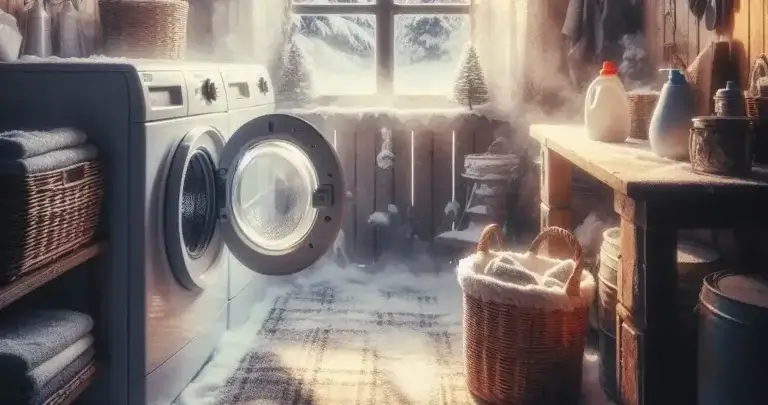Can I Run My Dishwasher in Freezing Weather? Extreme Cold Weather Affect on Appliances
Running your dishwasher during frigid temperatures may seem harmless, but extreme cold can damage appliances and cause leaks or flooding. Freezing temperatures can wreak havoc on a dishwasher’s pipes, hoses, pumps, valves, and other water components.
So should you run your dishwasher when it’s freezing outside? What dangers does cold weather pose? And how can you protect your appliance from damage? This comprehensive guide will explain everything you need to know about whether can i run my dishwasher in freezing weather.
Table of Contents
How Does Freezing Weather Affect Dishwashers and Other Appliances?
When temperatures plummet below 32°F (0°C), water components in appliances like dishwashers become vulnerable. As water freezes, it expands. This expansion can break pipes, hoses, valves, pumps, and reservoirs.
Additionally, freezing water inside a dishwasher’s reservoir or hoses can prevent proper water flow. This means the washer or refrigerator may not fill or drain correctly, as the cold temperatures can affect appliances.
And remember that it’s not just dishwashers at risk. Any appliance connected to a water supply can be damaged by frigid conditions, including:
- Washing machines
- Refrigerators/freezers with ice makers
- Humidifiers
- Coffee/espresso makers, the refrigerator, and the washer can be placed within safe temperature ranges when indoors.
- Steam mops
- Ice cream makers
- Soda makers
Garages, basements, porches, and other poorly insulated spaces are especially dangerous for appliances in winter. These areas often drop below freezing and let in icy drafts.
Where Should You Avoid Installing Appliances?

When positioning appliances like dishwashers, washers, and refrigerators, avoid placing them in areas where they may be exposed to cold temperatures.
- Against external walls
- Near drafty windows/doors
- In uninsulated garages or basements, the cold temperatures can potentially freeze the pipes of your washer and refrigerator.
- On cold concrete floors
- Under ceiling vents blowing in cold air
Instead, keep appliances in the interior, insulated rooms of the home.
Pay special attention to protecting second refrigerators/freezers. Frequently, these units are kept in garages or basements due to space constraints, which could affect appliances like the washer and refrigerator. Ensure the area maintains a temperature above freezing to protect your washer, refrigerator, and water heater during the winter.
Consider investing in products like insulating garage door panels, space heaters, or heated floor mats to keep appliances from freezing.
How Does Extreme Cold Damage Appliances?
Frigid conditions can harm appliances through:
- Frozen pipes/hoses – Water expanding inside components causes cracks and splits. These leaks can damage the appliance and flood the home.
- Malfunctioning components – Frozen pumps, valves, and reservoirs prevent proper water flow for filling, draining, etc. This affects performance.
- Broken water intake parts – If water inside an appliance’s water intake valve and supply hose freezes, pieces can break off inside the system. Repairing this requires disassembling the unit.
- Water leaks – Ice formation and splits in pipes/hoses allow water to leak, potentially onto electrical components. This can cause electric shorts and fires.
- Flooding – Major splits in water lines unleash gallons of water. Flooding can ruin flooring, cabinets, and other properties.
To avoid appliance damage or danger from freezing pipes, you must keep environments above 32°F (0°C). Monitor temperatures closely whenever it’s cold.
Can I Run My Dishwasher in Freezing Weather?
If temperatures outside are frigid but your dishwasher itself remains safely above freezing, running a normal cycle is fine.
However, take precautions if the dishwasher or connected hoses sit near a cold outside wall. The plummeting outdoor temperature can still seep inside and freeze water components.
Before running a cycle, inspect your dishwasher and surrounding areas. Look for:
- Ice or frost buildup on the appliance
- Frozen water on walls, windows, or vents
- Any visible splits or cracks on hoses
- Leaks under or around the dishwasher
Finding any of these signs indicates freezing is occurring. Do NOT run the dishwasher until the area warms safely above 32°F (0°C). Operating the appliance could further damage parts. Call a technician immediately to inspect for leaks and necessary repairs before using the dishwasher again.
Will My Dishwasher Still Work if the Garage/Basement Freezes?

If your dishwasher sits in an unheated basement, garage, or enclosed porch, use extreme caution when temperatures plummet. These poorly insulated areas often drop dangerously low at night and invite freezing drafts inside.
To keep the appliance safe:
- Monitor the room’s temperature. If it dips below 32°F (0°C), discontinue dishwasher use immediately.
- Disconnect water lines from the dishwasher or insulate the hoses with foam covers to prevent freezing/splits.
- Consider investing in a water heater for your devices or placing a space heater in the room to maintain safe operation temperatures.
- Drain any standing water inside the dishwasher itself to prevent ice expansion damage.
- If extreme cold is frequent, avoid installing appliances in these unprotected areas altogether.
Using your dishwasher when the surrounding room drops below freezing puts the appliance at serious risk of damage from frozen components and leaks. Heating the space appropriately or disconnecting water lines are the only safe options.
What Temperatures Are Safe for Dishwashers?
For safe operation and to prevent water component freezing, dishwasher ambient air and water temperatures should remain above 32°F (0°C) at all times. Temperatures even a few degrees below freezing start allowing dangerous ice formation.
Monitor your dishwasher area carefully as outside conditions plummet below 40°F (4.4°C). Check for air leaks, water exposure, or direct wall contact that could cause the appliance to drop too low.
Many dishwasher hoses and internal parts are also rated to safely withstand hot water up to 140°F (60°C). Exposing components like water pipes to temperatures outside of this 32°F (0°C) to 140°F (60°C) range risks damage and leaks, which could affect appliances.
Consider investing in supplementary heating if your dishwasher sits in an area prone to sub-freezing winter temperatures. This could include insulated floor mats, indoor space heaters, or heated garages. Maintaining a stable above-freezing environment is key to preventing damage.
How Can I Protect My Dishwasher From Freezing?
Use these proactive measures to safeguard your dishwasher during extreme cold:
- Disconnect water lines – In freezing weather, disconnect the water from your appliances, starting with detaching the dishwasher’s water inlet hoses from the wall supply lines. This removes vulnerable hose sections prone to ice damage. Plug the ends to contain moisture.
- Insulate pipes and hoses – Wrap any exposed water lines, inlet hoses, and drain lines with specially designed pipe insulation. This helps moderate temperatures.
- Heat the area – Consider adding a space heater to the vicinity of your appliances like the washer and dishwasher to maintain temperatures above freezing. Use extreme caution and follow fire safety standards if using supplementary heat.
- Drain standing water from the refrigerator and washer. – Empty any reservoirs or water pools sitting inside the dishwasher itself. This minimizes ice expansion damage.
- Avoid cold room placement – When possible, install dishwashers away from outer walls, windows, cold-air returns, and poorly insulated rooms. This reduces temperature flux and freezing risk.
- Seal drafts – Caulk and weatherstrip garage doors, wall cracks, and windows to protect dishwashers in attached rooms from freezing winds. Better insulation stabilizes temps.
With smart winterproofing and temperature regulation, your dishwasher can continue running smoothly even when temperatures plunge perilously low outdoors.
FAQs: Running Dishwashers in Freezing Weather
Get answers to common questions about operating dishwashers and other appliances when temperatures drop below freezing:
Can pipes freeze inside dishwasher walls?
Yes, if supply pipes run through uninsulated walls, freezing temperatures can infiltrate and expand water inside. This causes leaks or pipe bursts. Insulate walls or disconnect water lines as needed.
Is it safe to run my dishwasher in the winter if the room temperature stays normal?
Yes, if the ambient room temperature remains consistently above 32°F (0°C), you can safely operate the dishwasher per normal through freezing outdoor conditions. Monitor room temps carefully.
Can I insulate my dishwasher against the cold?
To keep your water pipes from freezing, wrap external hoses, inlet valves, and water lines with specialized heating pipe insulation. Draining interior water reservoirs also helps. Improving room insulation is also key.
What are garage/basement freezers at risk of?
Second freezers/fridges in unheated garages and basements are extremely vulnerable to freezing damage. The units themselves can malfunction, leak, or crack. Stored food also risks spoilage if temperatures vary.
What should I do if my dishwasher hoses freeze?
Turn off and disconnect the appliance immediately. Thaw the hoses completely before attempting to use the dishwasher again. Inspect closely for leaks or cracks needing repair by an appliance specialist before reconnecting.
Protect your dishwasher and home this winter! To protect your dishwasher and water heater from winter weather, follow these guidelines to prevent appliance damage and property disasters when the temperatures nosedive. Monitor conditions vigilantly and disconnect vulnerable water lines during extreme cold to keep your dishwasher running safely all season.
Stay cozy and happy washing!
Conclusion
Extreme cold poses serious risks of damage to appliances like dishwashers. Freezing temperatures can split water lines, jam pumps, break valves, and more. With smart preparations like disconnecting the water from appliances in winter weather, insulating water pipes, and ensuring room temperatures above freezing, you can continue using your appliances safely.
Monitor ambient and water temperatures carefully whenever the weather turns frigid. Check frequently for any signs of ice buildup or leaks indicating freezing issues. With proper winterproofing and caution, your dishwasher will continue cranking out sparkling clean dishes despite the frosty weather outside!








